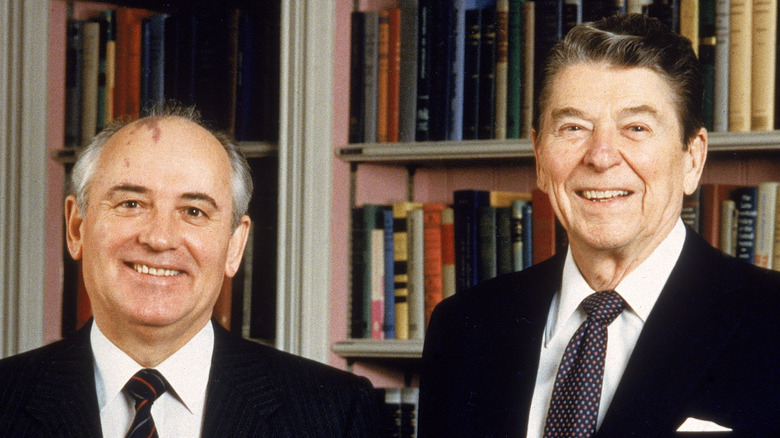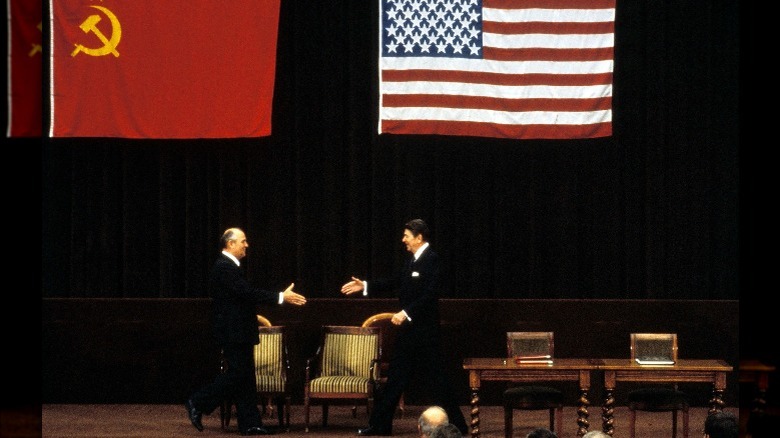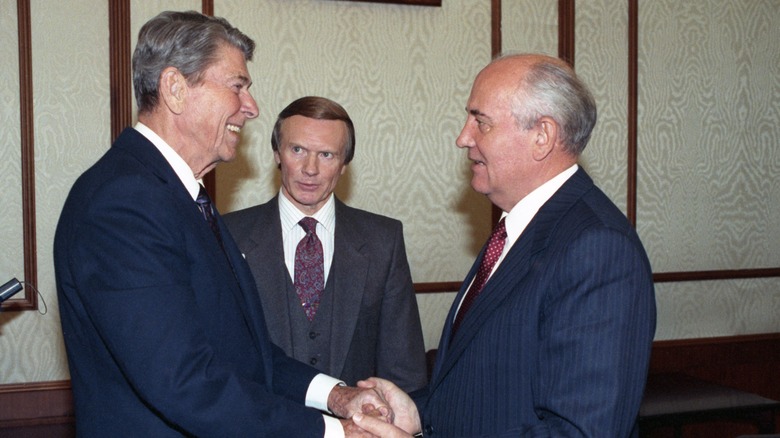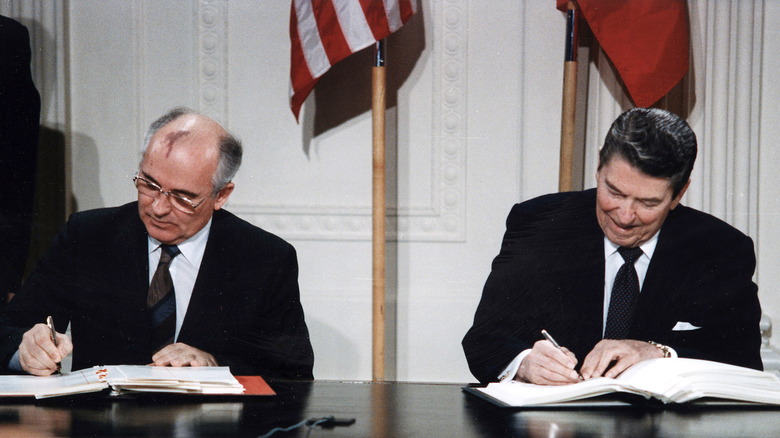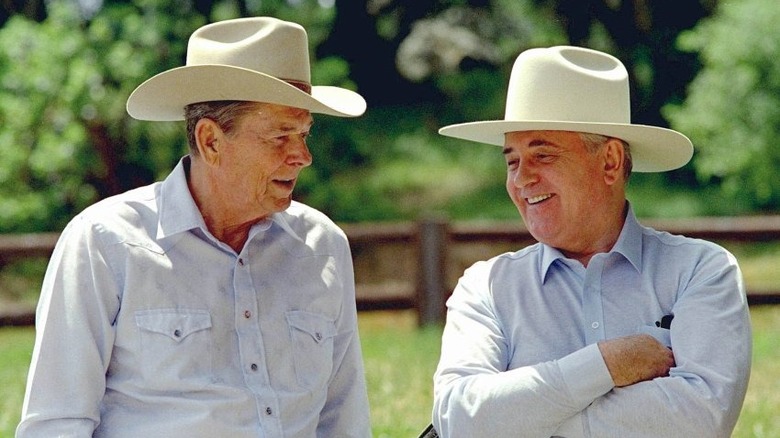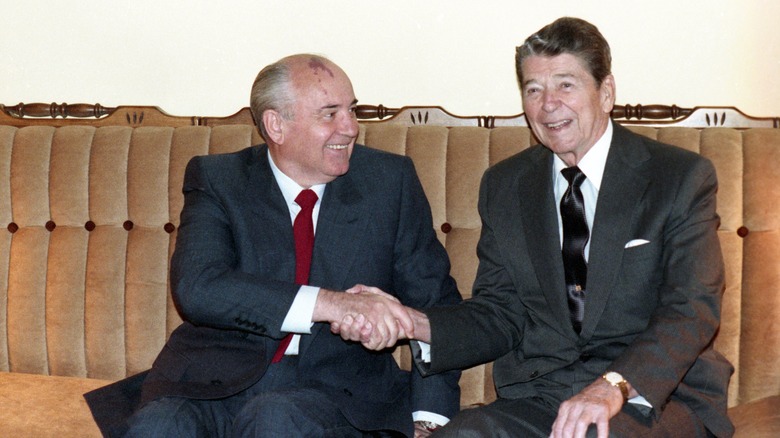The Truth About Mikhail Gorbachev And Ronald Reagan's Relationship
The decades-long Cold War was the result of the conflict between the United States and the Soviet Union that began shortly after World War II. Despite being allies during the war, the relationship between the two nations had always been tense. The U.S. was against the authoritarian rule of Joseph Stalin, and the Soviet Union held a grudge against the United States for refusing to acknowledge the Union of Soviet Socialist Republics (USSR) as a member of the international community. As noted by History Crunch, Stalin also had disagreements with Winston Churchill and Franklin D. Roosevelt at the Yalta Conference in 1945, and the division between Stalin and the two leaders was evident.
In December 1991, the Cold War came to a close, thanks in part to the unusual relationship between Soviet leader Mikhail Gorbachev and U.S. President Ronald Reagan, both of whom didn't want the tensions between their nations to end in a nuclear war.
Gorbachev and Reagan's first meeting
In 1983, President Ronald Reagan gave a speech to the National Association of Evangelicals wherein he referred to the Soviet Union as an "evil empire." Two years later, Mikhail Gorbachev assumed the position as the Soviet leader, and per History, Reagan was cautious about the new leader at first. Their first face-to-face meeting happened at the Geneva Summit, which was held in November 1985, in Geneva, Switzerland.
The agenda for the summit was for the two leaders to discuss the arms race and issues regarding nuclear weapons. The Soviet Union's military had been preparing themselves with a goal to win a nuclear war in case one ensues, and as a result, they had been accumulating nuclear weapons. However, unlike his predecessors, Gorbachev was open to the idea of common security. Some of the idea's principles state that security is not possible through military superiority and that all nations have a right to security (via the International Peace Bureau). He believed that security can only be achieved by cooperating with competitors and not fighting against them. Although Gorbachev and Reagan had differences in the way they wanted to implement policies, both had the goal of preventing a nuclear war.
They had mutual respect for each other
According to Atomic Heritage, the Geneva Summit went well despite the two leaders debating on certain topics. In fact, for Ronald Reagan, Mikhail Gorbachev stood out among previous Soviet leaders he'd met. He described the Soviet leader as having "warmth in his face and style, not the coldness bordering on hatred I'd seen in most other senior Soviet leaders I'd met until then." In his book titled "Turmoil and Triumph," George Schultz, who worked for the Reagan administration, recounted that first meeting and said that the chemistry between the two leaders was evident. "The easy and relaxed attitude toward each other, the smiles, the sense of purpose, all showed through," he wrote.
The good relationship between Gorbachev and Reagan was not instant. They disagreed on several issues, but they had respect. Gradually, they learned to trust each other. In 1988, a reporter asked Reagan about his prior statement regarding the Soviet Union being an "evil empire" and whether he still stood by it. He said that was no longer the case, adding, "That was another time, another era." When asked whether he and Gorbachev were friends, he said, "Yes," (via History).
The two leaders corresponded via handwritten letters
In 2013, Jason Saltoun-Ebin released a book titled "Dear Mr. President: Reagan/Gorbachev and the Correspondence That Ended The Cold War." The correspondence between the two leaders began even before they met at the Geneva Summit, as stated in the book (via the Huffington Post). Twelve letters were sent between the two before their first meeting, and 15 more were sent after that and before their second meeting at the Reykjavik Summit in Iceland in October 1986.
In the span of three years, Ronald Reagan and Mikhail Gorbachev exchanged more than 40 letters. It was through these letters that they formed a relationship that eventually developed into a genuine friendship. As noted by History, Reagan and Gorbachev debated and disagreed about each other's ideas, but they never stopped communicating with each other. In 1987, the two leaders had a meeting in Washington, D.C., where they signed the Intermediate-Range Nuclear Forces Treaty (INF Treaty), which eliminated a class of nuclear weapons. In addition, the treaty also included inspection and verification measures (per the U.S. Department of State).
Their relationship endured
The end of the Cold War happened gradually, and it finally ended during Mikhail Gorbachev's rule. He worked toward changes in Soviet Union's political system, and communist regimes crashed one by one. By the late 1980s, borders at the Eastern Bloc were taken down. Perhaps one of the most notable events that symbolized the end of the Cold War was the fall of the Berlin Wall in November 1989, according to the Atomic Archive. On December 26, 1991, the Iron Curtain — which divided Europe — was no more, and the Cold War officially ended.
On December 25, 1991, Gorbachev resigned as the leader of the Soviet Union, which had been dissolved. Reagan's presidency, on the other hand, ended in 1989 after eight years in the position. Despite no longer being political leaders, the two men maintained their friendship. As reported by the Los Angeles Times, Ronald and Nancy Reagan hosted Gorbachev, his wife, and their daughter during their two-week visit to the United States in 1992. Furthermore, Reagan presented Gorbachev with the first Ronald Reagan Freedom Award and described him as a "reliable ally" and "worthy competitor," as noted by UPI. Gorbachev also stated that their efforts as leaders made a difference.
Gorbachev and Reagan's unique friendship
Mikhail Gorbachev had only good things to say when asked about his relationship with Ronald Reagan. However, both acknowledged that they had a different kind of friendship. They made it a point to be civil toward each other despite their clashing opinions, and they remained respectful to one another. "We could argue like the devil for an hour or two. But we always shook hands and parted friends," Reagan once said (via UPI).
Ronald Reagan died on June 5, 2004, at 93 years old. In a statement, as reported by the Baltimore Sun, Gorbachev said that his friend's death was hard on him. He felt that it was fate that brought them together during his time as the leader of the Soviet Union. He further stated that their open communication and Reagan's sincerity allowed their political relations to grow into friendship, and he described him as an "honest rival" and friend. Gorbachev died on August 30, 2022, at 91 years old.
